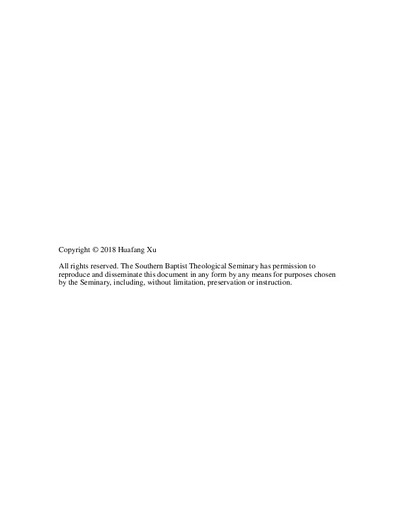Communion with God and Comfortable Dependence on Him: Anne Dutton's Trinitarian Spirituality
Subject
Dutton, Anne, 1692-1765Spirituality--Christianity
Trinity--History of doctrines--18th century
Abstract
This dissertation seeks to retrieve a crucial aspect of the spiritual heritage of Anne Dutton, her Trinitarian spirituality as it was developed in the historical context of eighteenth-century Trinitarian controversies in England and especially the Particular Baptists’ defense of the Trinity. It argues that Dutton’s Trinitarian spirituality is not only doctrinally orthodox, but also full of doxological devotion and practical comfort. It typifies the 1689 London Baptist Confession’s statement about the Trinity being the foundation of “communion with God and comfortable dependence on him.”
The first three chapters serve introductory and biographical purposes. Chapter 1 introduces the purpose of the thesis, the primary sources to be examined, and the organization of the dissertation. Chapter 2 presents a historical literature review of Dutton and her works. Chapter 3 sketches a portrait of Dutton in the four biblical images of the sinner, sojourner, servant and saint.
Chapter 4 supplies the historical context for Dutton’s Trinitarian spirituality. It attends to both the Trinitarian controversies in eighteenth-century England and the defense of the Trinity by such Particular Baptist ministers as John Gill, Benjamin Beddome, Benjamin Wallin, and Andrew Fuller.
Chapters 5 and 6 focus on the nature and work of the Trinity. Chapter 5 presents Dutton’s thought about the ontology of the Trinity, which highlights the co-deity and co-equality of the Father, Son, and Spirit. Chapter 6 studies her doctrine of the work of the Trinity. In addition to the tripartite work of the Father in election, the Son in redemption, and the Spirit in particular application, attention is also given to Dutton’s expostulations of the adoption of the Father, advocateship of the Son and the sealing of the Spirit. Both the distinctive work of the triune God and their unity are underscored in the economy of human salvation.
Chapters 7 and 8 deal with Dutton’s application of the Trinity in Christian experience. Chapter 7 examines her view of communion with the triune God primarily from her work, Walking with God and from comparison with John Owen’s work on the topic. The ways of this communion, which entail the primary way of Christ and the derivative ways of faith, worship, providence, and holiness are then illustrated by her spiritual autobiography. Chapter 8 discusses Dutton’s use of the Trinity in her epistolary counseling of the afflicted souls. They were directed to depend on the sovereign grace of the Father, the love of the Son, and the comfort of the Spirit.
This dissertation concludes with a call for re-centering Christian devotion and practices, such as worship, education, and counseling, on the Trinity as the way to revive the Christian life in praxis as well as in doctrine.

